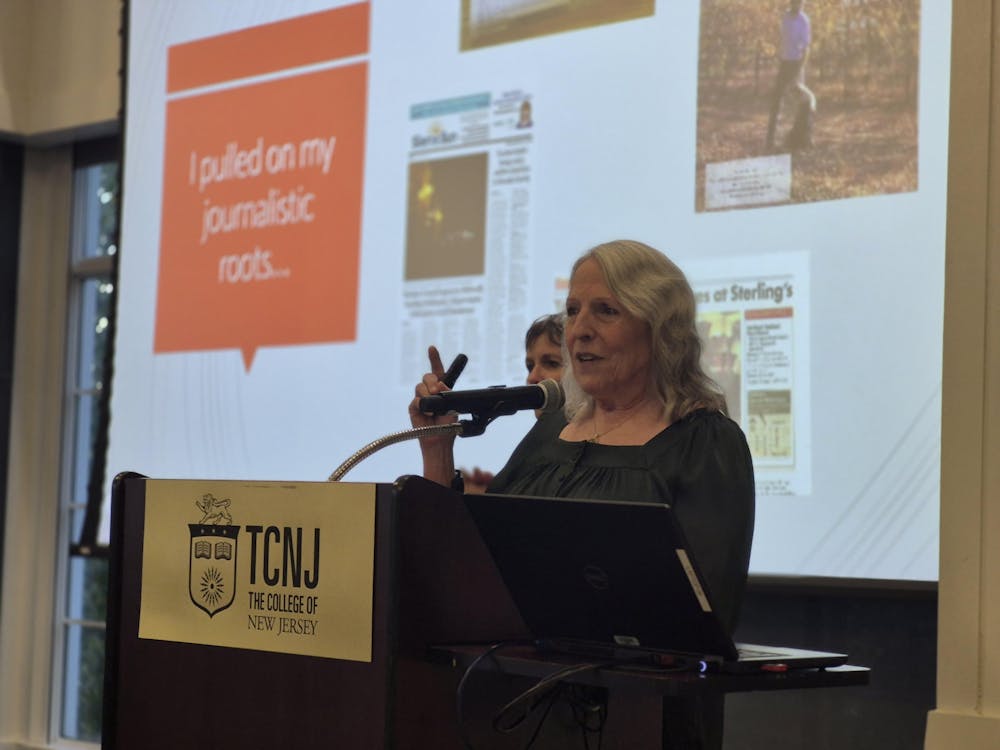By Raeanne Raccagno
News Editor
Ellen Hopkins shared her life’s struggles to exemplify the purpose behind the poignant stories that some areas have classified as unfit for their libraries during her talk at the College on Oct. 9 for National Book Banning Week.
National Book Banning Week was Oct. 5-11 this year, which was founded in 1982 by a librarian named Judith Krug. The American Library Association and the Association of American Publishers teamed up with Krug to organize the first event after a surge of book challenges and censorship occurred in schools, public libraries and bookstores, according to the American Library Association.
“It’s tempting,” Hopkins said, referring to the contemplation of “scrubbing” her writing to avoid censorship. “I made a pact with my readers that I would always tell the truth … so I have to write the good and the bad. So I have been tempted to, but no, I refuse to.”
Hopkins has been near the top of the list of most-banned authors, with 523 bans during the 2022-2023 school year regarding 19 of her books, according to PEN America. She joked during her presentation that Stephan King has surpassed her in being the most banned author in America.
The event was planned by Kristen Luettchau, an adjunct professor in the English department, and Ewa Dziedzic-Elliott, an education librarian at the R. Barbara Gitenstein Library. It was co-sponsored by the School of Education, Department of English, the library and multiple student groups: Kappa Delta Pi, Sigma Tau Delta and the Student New Jersey Education Association.
“I would call us an intimate group, but I’m not discouraged by it,” Dziedzic-Elliott said, describing the smaller crowd size. “Each and every one of you carries some kind of interest in the subject, some kind of spark that I hope you will share.”
To give more insight into the inspiration behind her books, Hopkins gave a “Life=Challenges” presentation that described her personal history.
Hopkins shared with the audience how her daughter struggled with an addiction to crystal meth for 25 years. Watching the drug change her daughter’s life is what inspired her first book, “Crank,” which was published in 2004.
“That is the book that changed my life,” Hopkins said.
Hopkins started writing “Crank” when her daughter went to prison. She explained how she wanted to get inside her daughter’s head to “figure out what happened to my kid.”
When Hopkins first started writing the book, she did so in prose, but she put it away after a while because she struggled to properly display her daughter’s voice. She eventually did a workshop at a conference with Sonya Sones, who had recently published her verse novel, “Stop Pretending.” Hopkins said “Crank” started working when she attempted to do it in a verse style.
Hopkins said there was a time when she was invited to schools to talk about “Crank” when students were doing drug prevention programs to hear about the personal toll of addiction.
“That book went into schools, it was taught in schools,” Hopkins said. “And now all of a sudden we've got into this place where they don't want it, they don't like it because it's got drugs in it. It's about addiction. I cannot write a book about drugs without putting drugs in the book.”
Since being published, Hopkins has received thousands of messages regarding “Crank” from her readers, telling her how it changed their lives for the better and helped many who were struggling with addiction or looking for insight on the issue.
“Do my books take you to dark places? Yes. Because those places exist, and also because there is light beyond the darkness,” Hopkins said.
After her presentation, the conversation was opened up to attendees who wanted to ask the author any questions.
“Book banning is just everything that's wrong with our country right now,” said Sarah Tamagny, a junior English major, who attended the event. “As someone who wants to be a writer myself, I really value that she [Hopkins] writes from personal experience, but does it in such a meaningful way that so many people can connect with.”
Before Hopkins gave her presentation, the event also included a screening of “Banned Together,” a 2025 documentary that follows three students and the adults who supported their initiatives to fight against book bans happening in their schools. Hopkins is featured in the film, in which the three students meet and have a conversation with her on the fight against book bannings.
From noon until 3 p.m. on the event day, students and faculty involved with the event held an open house in Education Building room 212, with a slew of activities and also a chance for students to check out banned books from the College’s library.
Sigma Tau Delta had a display with frequently banned and challenged books and information about the top 100 banned and challenged books available for students to look through. Kappa Delta Pi made bookmarks that highlighted some banned books, like “To Kill A Mockingbird,” to give away. Participating students were also invited to create their own bookmarks.
Luettchau held a table with information about getting involved in reading advocacy on the national level. The task would include reading a book that is not part of the College’s Intellectual Freedom Center database and writing a book rationale to support the inclusion of this book in a school or classroom library, along with the New Jersey State Standards with which it aligns for teaching.
The New Jersey Association of School Librarians was also present, giving out information about support for schools and libraries. They also had a table with information available to fight censorship in New Jersey, including a QR code that helped students find out who their legislators are to send them a message proposing book bans.
“We need voices like Ellen's to support our freedom to read and also to learn about others' experiences,” Luettchau said. “Ellen knows the value of reading.”







